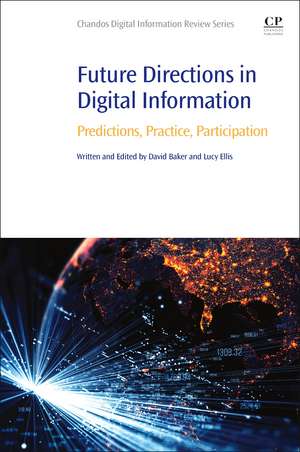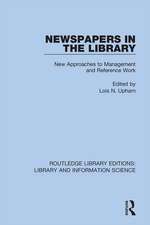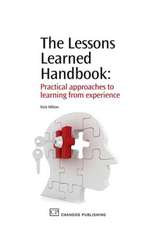Future Directions in Digital Information: Predictions, Practice, Participation: Chandos Digital Information Review
Editat de David Baker, Lucy Ellisen Limba Engleză Paperback – 29 oct 2020
- Presents a global perspective on how information science and services are changing and how they can best adapt
- Gives insight into how managers can make the best decisions about the future provision of their information services
- Engages key practical issues faced by information professionals such as how best to collect and deploy user data in libraries
- Presents digital literacy as a global theme, stressing the need to foster literacy in a broad range of contexts
- Interrogates how ready information professionals are for emergent technological and social change across the globe
Preț: 436.73 lei
Preț vechi: 561.80 lei
-22% Nou
Puncte Express: 655
Preț estimativ în valută:
83.57€ • 87.65$ • 69.57£
83.57€ • 87.65$ • 69.57£
Carte tipărită la comandă
Livrare economică 25 martie-08 aprilie
Livrare express 25 februarie-01 martie pentru 76.24 lei
Preluare comenzi: 021 569.72.76
Specificații
ISBN-13: 9780128221440
ISBN-10: 0128221445
Pagini: 420
Ilustrații: 40 illustrations (5 in full color)
Dimensiuni: 152 x 229 x 20 mm
Greutate: 0.56 kg
Editura: ELSEVIER SCIENCE
Seria Chandos Digital Information Review
ISBN-10: 0128221445
Pagini: 420
Ilustrații: 40 illustrations (5 in full color)
Dimensiuni: 152 x 229 x 20 mm
Greutate: 0.56 kg
Editura: ELSEVIER SCIENCE
Seria Chandos Digital Information Review
Public țintă
The whole book is more likely to be of interest to those involved in strategy and blue skies thinking, e.g. directors of libraries and information services, academics and researchers in information science. Individual chapters would be of interest to some of the sectors mentioned in the proposal under ‘Target audience’.Cuprins
1. Future directions in digital information: Scenarios and themes
Part One – Strategy and Design
2. Current research information systems and institutional repositories: From data ingestion to convergence and merger
3. Effective strategies for information literacy education: Combatting 'fake news' and empowering critical thinking
4. Designing library-based research data management services from bottom-up
Part Two – Who are the users?
5. The power of accessible knowledge: Universities, suppliers, and transparency in the information age
6. Who is the online public library user?
7. Digital culture: The dynamics of incorporation
8. Information behaviour in an online university
Part Three – Where formal meets informal
9. Mobile technology and educational games in HE
10. The evolving role of library collections in the broader information ecosystem
11. Social media as a professional development tool for academic librarians
Part Four – Applications and delivery
12. Closing the digital skills gap: Working with business to address local labour market policy
13a. 'It’s all online!' Creating digital study resources for orchestral musicians
13b. Library acquisition, delivery, and discovery for a creative university
13c. Digital transformation trends in education
14. Transforming reference work into teaching: From a librarian to an information literacy-oriented university professor
Part Five – New Paradigms
15. Envisioning Education 4.0—A scenario planning approach to predicting the future
16. Data-driven modelling of public library infrastructure and usage in the United Kingdom
17. How can the specific skills of the librarian in a digital context be used in the future?
18. The user as a data source: The advance of surveillance capitalism
19. Future directions: Emergent process; constant invention; sum total
Appendix: Delphi questions
Part One – Strategy and Design
2. Current research information systems and institutional repositories: From data ingestion to convergence and merger
3. Effective strategies for information literacy education: Combatting 'fake news' and empowering critical thinking
4. Designing library-based research data management services from bottom-up
Part Two – Who are the users?
5. The power of accessible knowledge: Universities, suppliers, and transparency in the information age
6. Who is the online public library user?
7. Digital culture: The dynamics of incorporation
8. Information behaviour in an online university
Part Three – Where formal meets informal
9. Mobile technology and educational games in HE
10. The evolving role of library collections in the broader information ecosystem
11. Social media as a professional development tool for academic librarians
Part Four – Applications and delivery
12. Closing the digital skills gap: Working with business to address local labour market policy
13a. 'It’s all online!' Creating digital study resources for orchestral musicians
13b. Library acquisition, delivery, and discovery for a creative university
13c. Digital transformation trends in education
14. Transforming reference work into teaching: From a librarian to an information literacy-oriented university professor
Part Five – New Paradigms
15. Envisioning Education 4.0—A scenario planning approach to predicting the future
16. Data-driven modelling of public library infrastructure and usage in the United Kingdom
17. How can the specific skills of the librarian in a digital context be used in the future?
18. The user as a data source: The advance of surveillance capitalism
19. Future directions: Emergent process; constant invention; sum total
Appendix: Delphi questions
Recenzii
"What are some of the future directions for digital information, based on current practices, policies, and partnerships? This book provides some reasonable assumptions and details from thirty-four library leaders from around the world…..The multinational approach to this book is its primary advan tage, since it allows glimpses into the wider viewpoints and challenges of libraries and information organizations around the world on these topics. I highly recommend this book for librarians involved in digital activities and planning in higher education." --Journal of Electronic Resources Librarianship
"This is a valuable compilation that conveys a diversity of approaches to meet organisational goals, make advances for user groups and help with optimising quality digital information resources, along with introducing concepts such as surveillance capitalism. As a snapshot in time, the book contains some valuable accounts and references to a period during which many of us have rapidly shifted our practice and participation with a focus on digital content." --Journal of the Australian Library and Information Association
"This is a valuable compilation that conveys a diversity of approaches to meet organisational goals, make advances for user groups and help with optimising quality digital information resources, along with introducing concepts such as surveillance capitalism. As a snapshot in time, the book contains some valuable accounts and references to a period during which many of us have rapidly shifted our practice and participation with a focus on digital content." --Journal of the Australian Library and Information Association

















